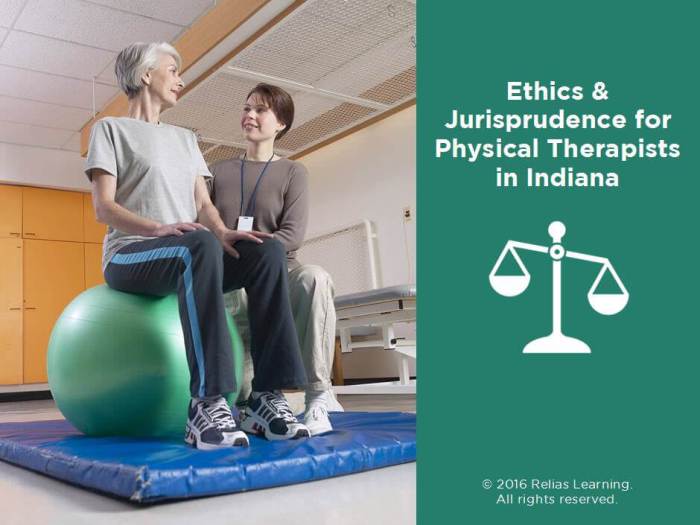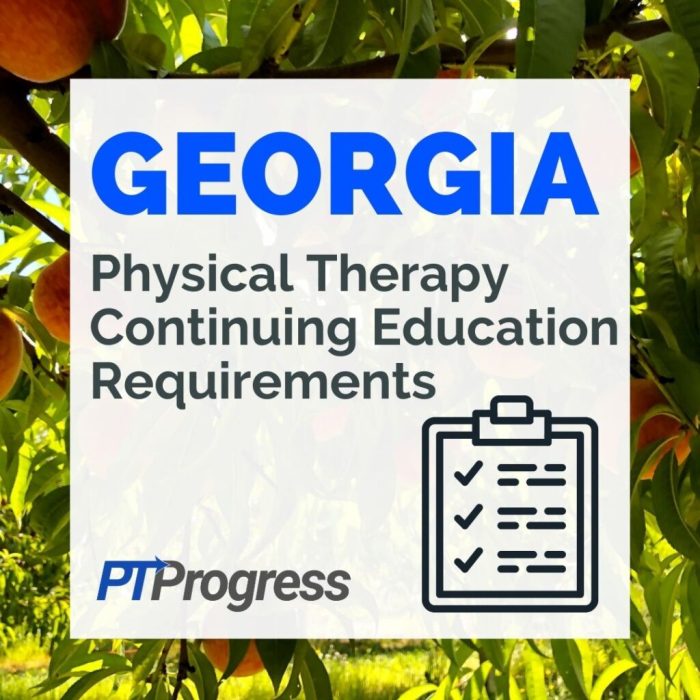Ethics and jurisprudence physical therapy GA is a captivating subject that delves into the ethical principles and legal framework governing physical therapy practice within the state of Georgia. This comprehensive exploration unravels the complexities of ethical dilemmas, legal regulations, and professional boundaries, providing a profound understanding of the responsibilities and obligations of physical therapists in Georgia.
Georgia’s physical therapy landscape is meticulously shaped by ethical principles that guide practitioners in their interactions with patients, colleagues, and the community. The Georgia Physical Therapy Association plays a pivotal role in upholding these principles, fostering ethical conduct and ensuring the highest standards of care.
Ethical Principles in Physical Therapy in Georgia

Physical therapists in Georgia are guided by ethical principles that ensure they provide safe and effective care to their patients. These principles include autonomy, beneficence, non-maleficence, and justice. Autonomy refers to the patient’s right to make decisions about their own care, while beneficence requires physical therapists to act in the best interests of their patients.
Non-maleficence means that physical therapists must avoid harming their patients, and justice dictates that they treat all patients fairly and equitably.
Ethical Dilemmas in Physical Therapy, Ethics and jurisprudence physical therapy ga
Physical therapists may face ethical dilemmas in their practice, such as when a patient refuses treatment that is medically necessary or when a patient’s goals conflict with the physical therapist’s professional judgment. In these situations, physical therapists must carefully consider the ethical principles involved and make decisions that are in the best interests of their patients.
Role of the Georgia Physical Therapy Association
The Georgia Physical Therapy Association (GPTA) plays a vital role in promoting ethical conduct among physical therapists in the state. The GPTA provides continuing education courses on ethical issues, develops ethical guidelines for physical therapists, and advocates for policies that protect the public.
Legal Framework for Physical Therapy in Georgia

The practice of physical therapy in Georgia is governed by laws and regulations that ensure patient safety and protect the public. The Georgia Physical Therapy Practice Act defines the scope of practice for physical therapists, establishes licensure requirements, and Artikels the ethical and legal responsibilities of physical therapists.
Scope of Practice for Physical Therapists in Georgia
Physical therapists in Georgia are licensed to assess, diagnose, and treat movement disorders and injuries. They can use a variety of techniques, including exercise, massage, and electrical stimulation, to help patients improve their mobility, function, and quality of life.
Process for Obtaining a Physical Therapy License in Georgia
To practice physical therapy in Georgia, individuals must obtain a license from the Georgia Composite Medical Board. The licensing process includes passing a national exam, completing a period of supervised practice, and meeting continuing education requirements.
Informed Consent in Physical Therapy: Ethics And Jurisprudence Physical Therapy Ga

Informed consent is a legal and ethical requirement that ensures that patients understand the risks and benefits of a medical procedure before they agree to undergo it. In physical therapy, informed consent must be obtained from patients before they receive any treatment.
Elements of Informed Consent
The elements of informed consent include a description of the procedure, the risks and benefits of the procedure, the alternatives to the procedure, and the patient’s right to refuse treatment. Physical therapists must provide this information to patients in a clear and concise manner, and they must ensure that patients understand the information before they sign the consent form.
Legal Implications of Obtaining Informed Consent
Obtaining informed consent is essential to protect patients from harm and to ensure that they are making decisions about their care based on accurate information. Physical therapists who fail to obtain informed consent may be held liable for malpractice.
Answers to Common Questions
What are the key ethical principles that guide physical therapists in Georgia?
Physical therapists in Georgia adhere to core ethical principles, including autonomy, beneficence, non-maleficence, justice, and fidelity, ensuring ethical decision-making and patient-centered care.
How does the legal framework impact physical therapy practice in Georgia?
Georgia’s legal framework Artikels the scope of practice, licensure requirements, and legal responsibilities of physical therapists, providing a clear understanding of their professional obligations.
Why is obtaining informed consent crucial in physical therapy?
Informed consent empowers patients to make informed decisions about their treatment by providing them with clear information about procedures, risks, and benefits, fostering trust and shared decision-making.
What are the ethical and legal implications of maintaining patient confidentiality in physical therapy?
Physical therapists have a legal and ethical duty to protect patient privacy and maintain confidentiality, safeguarding sensitive information and fostering a trusting patient-therapist relationship.
How can physical therapists maintain appropriate professional boundaries?
Establishing and maintaining professional boundaries is essential to ensure a respectful and ethical therapeutic relationship, preventing any form of exploitation or abuse of power.
